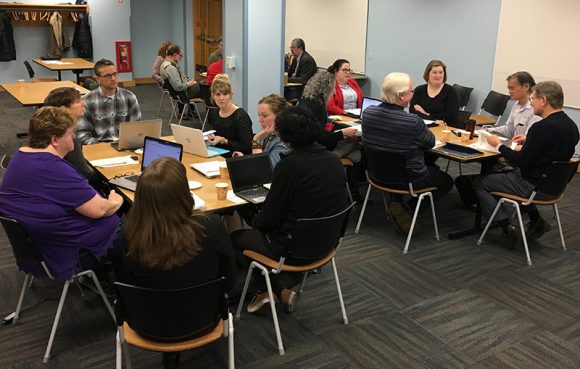Earlier this month, a group of 18 Penn State librarians gathered in the Mann Assembly Room to learn about digital humanities and information literacy. I have been thinking about digital humanities instruction for some time and how, with all of its emphasis on showing how software works, information literacy was missing. After a few discussions with Rebecca Miller, we decided to create a workshop to see what digital humanities approaches might learn from ACRL’s Framework for Information Literacy and what digital humanities might offer to library instruction.
The workshop began with surveys of digital humanities and information literacy, which was then followed by group conversations about three articles related to the workshop topic. Right before lunch was an attempt at a digital humanities classroom activity that also served to introduce participants to a few major digital humanities projects that could further stimulate thinking about the possibilities of digital humanities activities. The final activity of the day had participants back in groups to create a lesson plan for an instruction session.
Our stated outcomes for the workshop were to situate digital humanities within information literacy frameworks, think about integration of digital humanities tools into the library classroom, develop a lesson plan that centers around the use of one or more digital humanities approaches within an information literacy context, and develop a community of practice surrounding digital humanities and information literacy. Given that many of the participants had limited exposure to digital humanities methods, I was happy to see librarians expressing interest in thinking more about how digital humanities might fit into their work. Truly, this was just the beginning of a conversation and I’m working on different ways to keep these connections growing.
If you would like to talk more about this workshop or digital humanities in general, please contact me at jer308@psu.edu.
– submitted by John Russell, Center for Humanities and Information


